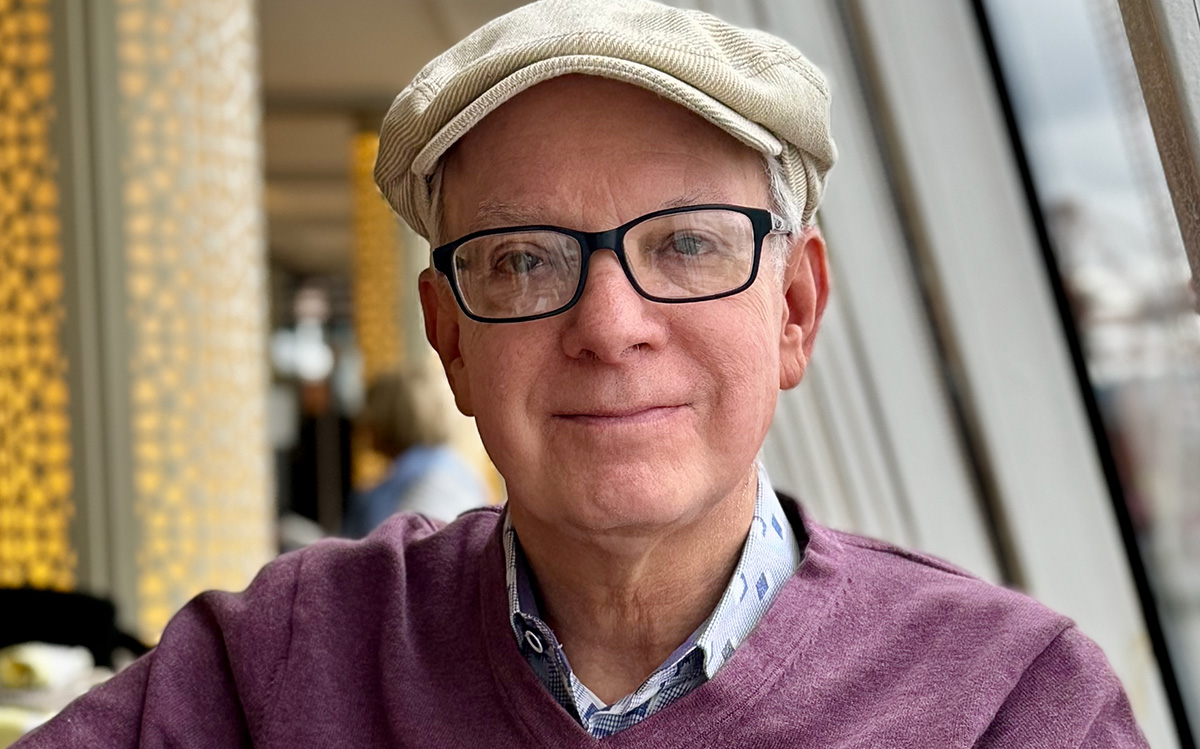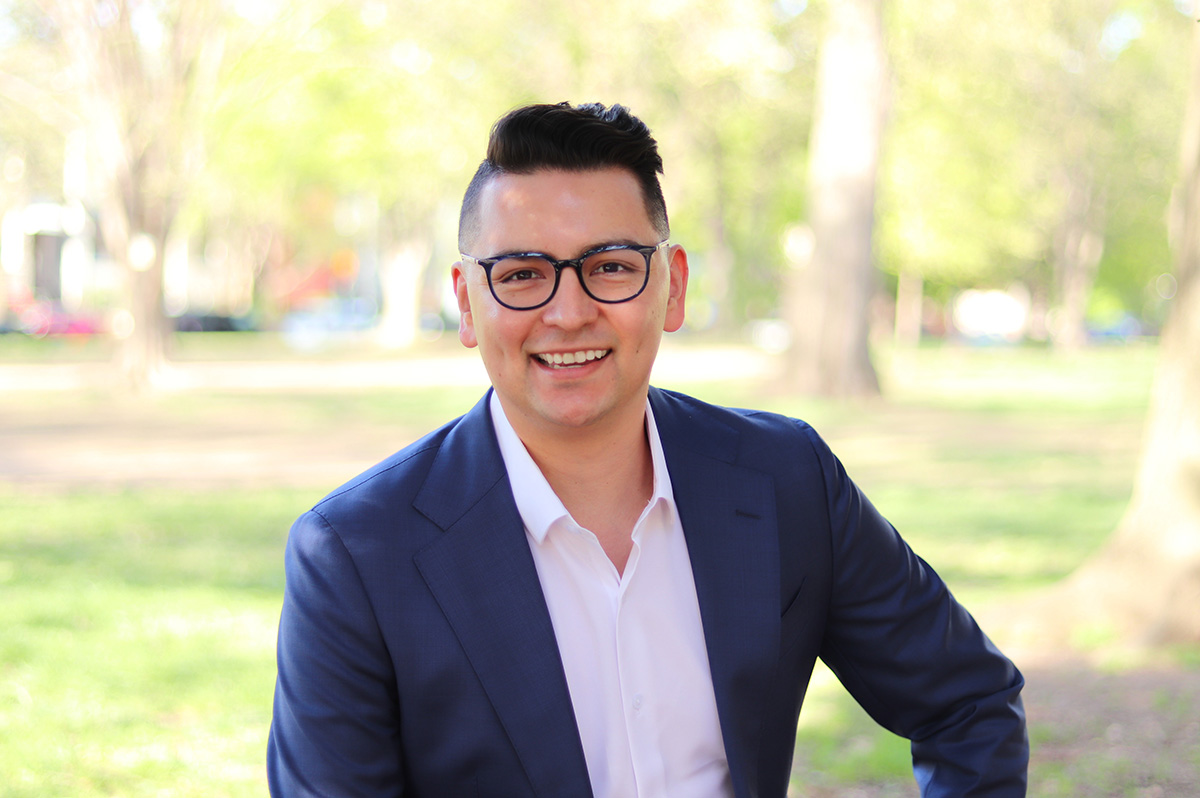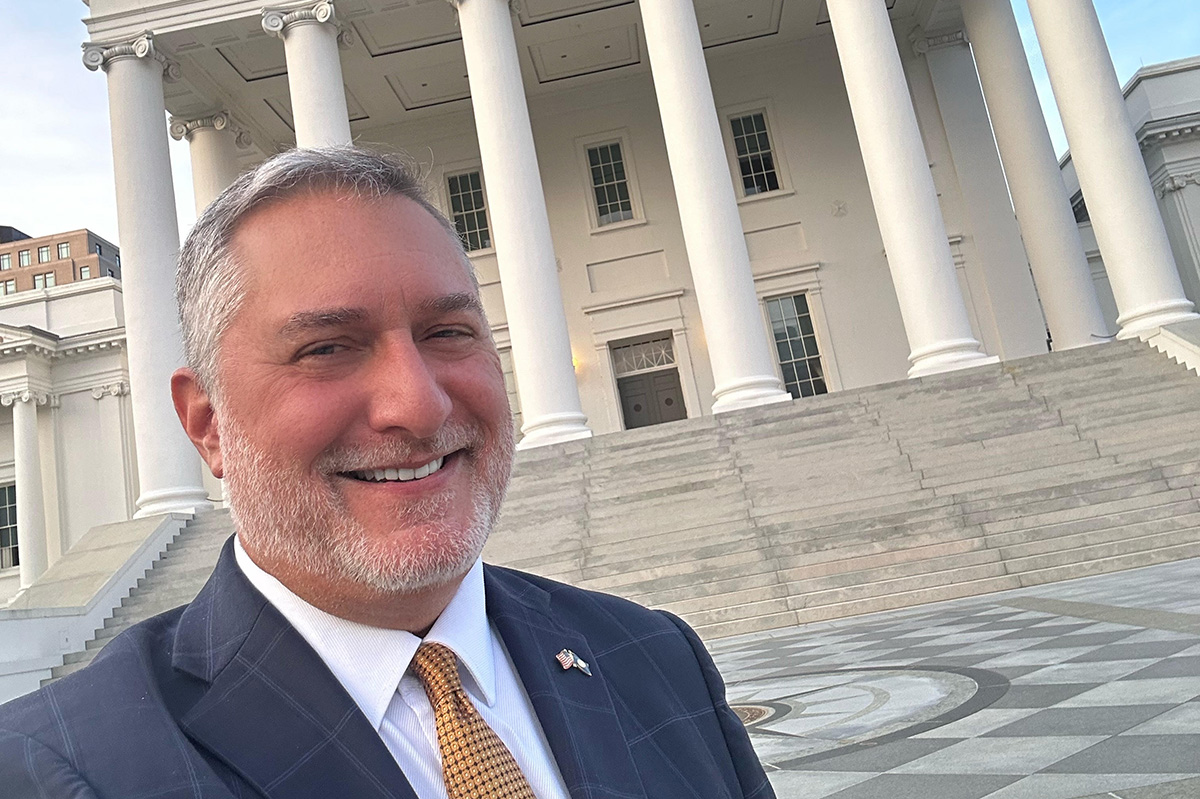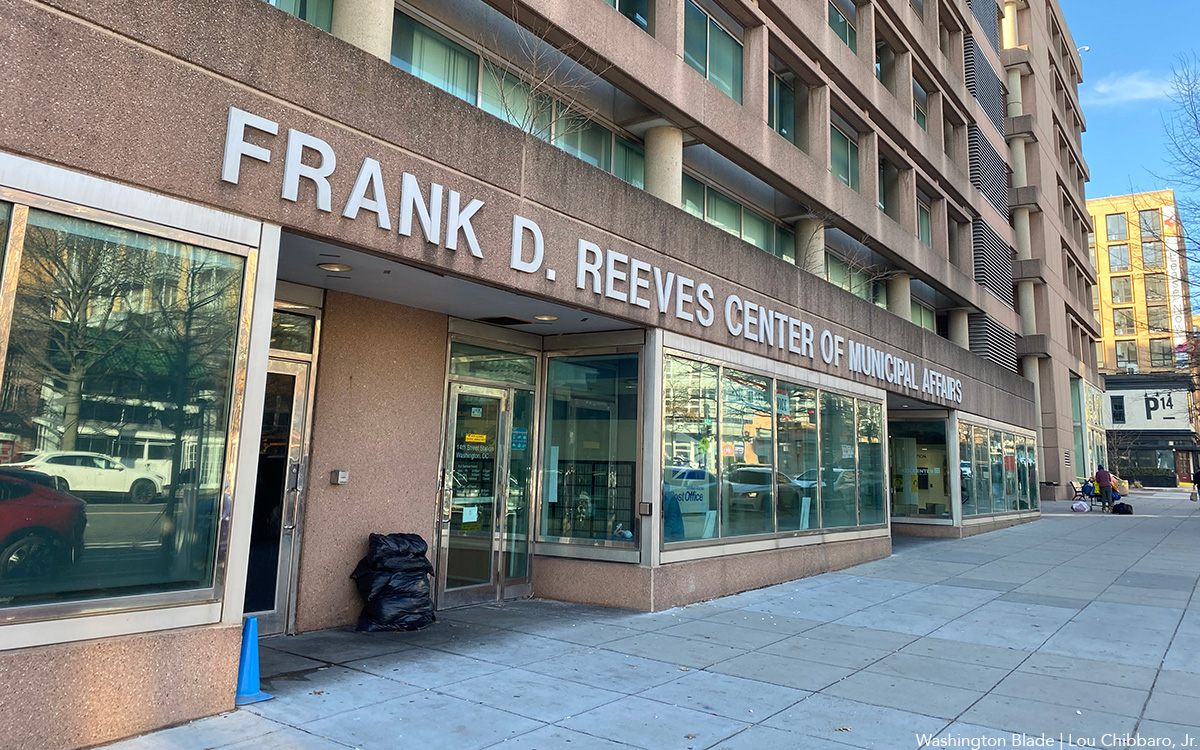Local
The lawyer strengthening LGBTQ partnerships for five decades
Larry Jacobs’s lifetime of advocacy

When most people come out, becoming a pillar of the queer community isn’t usually top of mind. Instead, they often reflect on gaining confidence in their environment, finding love and relationships, and embracing their true selves. But when one Maryland lawyer came out, he unexpectedly found himself becoming a hero to many.
Fifty years ago Lawrence (Larry) Jacobs was living a life that looked picture-perfect: A successful law career, a wife, and a son. But when he came out as gay, everything changed.
“When I started practicing law 50 years ago, there was basically no such thing by and large as openly gay people, much less openly gay lawyers,” Jacobs told the Blade about his days prior to coming out. “I was married to a woman and had a kid. I was pretty closeted until the first 10 years of my career.”
Despite the beginnings of a successful career, Jacobs felt he wasn’t being truly himself and decided to change that. It was difficult leaving his familiar beginnings and facing unsupportive people.
“When I did come out in ‘83 I got tossed out of my own law firm for being gay by my [law] partner,” he said. “So that was not a good start.”
Yet he didn’t let this change in track become a setback. Instead he used what he learned through college, law school, and life to direct him to where he needed to be. This direction, stemming from his understanding of law, began to flourish into much more for the Maryland LGBTQ community.
“I started representing gay business owners in doing corporate and business work, which was always something I was interested in,” Jacobs said. “So lo and behold, as I got more comfortable being out and I had a [romantic] partner, I started nibbling around the edges of doing activist work in Montgomery County.”
This work began with working on wills and estate planning.
“I had my first set of gay business owner clients who said, ‘Larry, we need wills,’” he recounted. “And I said, ‘I’ve never written a will.’ And they basically said, ‘Figure it out.’ That was almost 2,000 wills ago.”
During the time when Jacobs started writing wills in the 1980s, HIV, AIDS, bigotry, and sadness came to many in the community with little support from mainstream politicians.
“You know the old AIDS days, ‘80s and ‘90s, where the families would swoop in and carry the body off to Iowa and the partner would never see them again,” Jacobs recalled. “There were all these heartbreaking stories about that.”
He explained that these stories were not just kept to the queer media sidelines either. This issue was growing more and more prevalent in American society.
“One of the turning points, ironically, was a made-for-TV movie that was on HBO called ‘If These Walls Could Talk.’” Jacobs said. “It was a series of vignettes about lesbians. A fabulous actress played a grieving surviving spouse of her partner who had just died. They’re literally carrying stuff out of the house, carrying the TV and furniture and paintings out, and she’s sitting there crying.”
Seeing these tragic stories playing out in front of him, both on screen and in real life motivated Jacobs. He knew he could do more to help.
“What little bits of things can I do to make gay life better in Montgomery County, for the people that come after me,” Jacobs began to wonder. He realized that in the fight for rights, being seen is crucial to gaining acceptance.
“Working with some people, we actually put together early Montgomery Prides and ran them for a few years, just to sort of build political visibility,” he said. “I kept telling people, ‘Nobody’s gonna listen to us if they don’t see us!’ And then right around the same time, around ‘95, everything just kind of took off.”
“I got appointed to the Montgomery County Human Relations Commission by our then county executive, Doug Duncan, as an openly gay man,” Jacobs said. “Well, I had never been an openly gay man much of anything before then, but it was like, ‘Yeah, yeah, OK.’”
This seat on the Montgomery County Human Relations Commission gave Jacobs the ability to wield power to help those who needed it the most. He remembered that fighting for LGBTQ student rights in schools was a particularly big hurdle that seems all too familiar today.
“Through an odd combination of coincidences, I, with Bonnie Berger, launched the Safe Schools movement in Montgomery County to protect LGBT kids in schools, and that turned into a three ring media circus,” he began to explain. “I mean, you want to see ugly? It included getting interviewed on a radio station with a Christian fundamentalist woman who said right to my face, ‘You know, gay men on average die at age 40.’ I was like, ‘Yeah, I’m already past that. So is my partner.’”
Despite the “three ring circus,” Jacobs and Berger were able to make progress.
“We did get it passed, it got swept under the rug, but eventually we got more supportive schools,” he said. “But then I sort of somehow got involved more on the state level with the statewide organization that was then ironically called FreeState Justice.”
This then marked a shift from fighting for local policy changes to state policy changes, which Jacobs foresaw as the next step to gaining equality.
“We were desperately trying to get domestic partnership benefits,” Jacobs explained. “Nobody could get married. If you’re not married to somebody, you’re a stranger, whether that’s in Maryland or even in the District. Unless you’re registered domestic partners, you’re nothing [in the eyes of the law].”
Jacobs used his platform to inform the queer public. Without legal domestic partnerships he understood that everything two people in love had, regardless of gender and gender expression, could be taken away in an instant.
He started sharing his information by tabling and talking with members of the LGBTQ community about the state of things wherever he could, highlighting what could happen if a partner dies.
“Sometimes my husband and I, well, I would get a booth at Pride, and my husband would come with me and swelter. Sometimes my son would come with us and swelter, and it just started growing,” Jacobs said.
He would share stories about how having legally binding documents can protect a couple even against the most hateful of people.
“I had these two elderly women, one of whom was sick and we knew her partner was going to die,” he began. “I don’t remember how old she was, but she was sick. She died not long thereafter, and my client, the surviving client, went into the funeral home, and they gave her a hard time. ‘Who the hell are you? Why do you think you can make decisions?’”
“And she literally called me up and told me this. She [then] brought in a manila envelope with all the documents that we had done and pulled out the funeral document that named her, of course, as the power behind the throne, and handed it over to the funeral director, and he went ‘Oh, OK. That’s all we need.’”
While many of the issues that had plagued same-sex couples prior to Obergefell v. Hodges, the Supreme Court case that gave same-sex couples the same protections as opposite-sex couples, went away, Jacobs made it very clear legally being seen as a couple is the strongest defense to protecting everything you and your partner own.
“There’s certainly more acceptance because of marriage equality,” Jacobs explained. “And I will, without violating client confidentiality, tell you there are numerous clients that I have said to, ‘You need to get married. Yes, we’re doing these great documents, but you need to get married too for this and this and this and this reason.’ The right documents and a wedding license are a very powerful combination. Neither one by itself is foolproof, and marriage gets you a lot of things, but doesn’t get you everything.”
To summarize an extremely rewarding and impactful career Jacobs offers this piece of advice: “If I could be remembered for anything it would be ‘Get married, and get married while you can, because someday you’re going to need it, want it!” Jacobs said he plans to retire effective Dec. 27.
District of Columbia
Wanda Alston Foundation names new executive director
Longtime LGBTQ rights advocate Cesar Toledo to succeed June Crenshaw

The Wanda Alston Foundation, the D.C.-based organization that has provided housing and support services for homeless LGBTQ youth since its founding in 2008, announced it has appointed longtime LGBTQ rights advocate Cesar Toledo as its new executive director.
In an April 22 statement, the organization said that as part of a planned leadership transition launched in November 2024, Toledo will succeed June Crenshaw, who Alston Foundation officials and LGBTQ community activists say has led the organization with distinction in her role as executive director for the past nine years.
In a statement released last November, the foundation announced Crenshaw was stepping down from her role as executive director after deciding to “to step into her next chapter.”
“June’s leadership has been truly transformative,” said Alston Foundation Board Chair Darrin Glymph in the group’s April 22 statement. “We are immensely grateful for her dedication and equally excited for the energy and experience that Cesar brings to lead us into this next chapter,” Glymph said.
“A seasoned LGBTQ+ advocate, Cesar brings over a decade of experience leading national campaigns, shaping public policy, and building inclusive communities,” the statement released by the group says. “Most recently, he served as the National LGBTQ+ Engagement Director for the Harris for President Campaign and has built a career focused on advancing equality and equitable education,” it says.
Biographical information about Toledo shows that immediately prior to working for the Harris For President Campaign, he served since April 2023 as deputy director for Democrats for Education Reform DC (DFER DC), a political group that helps to elect candidates for public office committed to quality education for all students, including minorities, people of color and LGBTQ youth.
Before joining DFER DC, Toledo served as political director for the LGBTQ+ Victory Fund, where he assisted in electing out LGBTQ candidates to all levels of public office across the U.S.
“I’m really excited about joining the Wanda Alston Foundation,” Toledo told the Washington Blade. “After a decade of working at the intersection of politics and policy and advancing political candidates and equitable education here in D.C., I wanted to shift my career to direct services to the most vulnerable folks in the LGBTQ+ family and our homeless youth,” he said.
Among other things, he said he would push for increasing the Alston Foundation’s visibility and mainlining its services for LGBTQ youth at a time when the national political climate has become less supportive.
A statement on its website says the Alston Foundation was founded in 2008 “in memory of Wanda Alston, a fierce LGBTQ+ activist, national advocate, and government official who was admired by District residents.”
The statement adds, “The foundation opened the first housing program in the nation’s capital in 2008 providing pre-independent transitional living and life-saving support services to LGBTQ+ youth.”
In a separate statement, the Alston Foundation announced it would hold a “thank you” celebration of appreciation for June Crenshaw from 6-8 p.m. on May 20 at Crush Dance Bar located at 2007 14th Street, N.W. in D.C.
“Let’s come together to celebrate her dedication and commitment for everything she has done for the LGBTQIA homeless youth population,” the statement says.
Virginia
Gay talk show host wins GOP nom for Va. lieutenant guv
John Reid becomes first out gay nominee for statewide office in state

John Reid, a conservative gay radio talk show host in Richmond for many years, this week secured the Republican nomination for the office of lieutenant governor in Virginia, becoming the first known openly gay person to be nominated for a statewide office in that state.
Reid secured the nomination after his only rival in the Republican primary, Fairfax County Supervisor Pat Herrity, dropped out of the race this week for health reasons.
Herrity’s decision to withdraw from the race finalized the GOP nominees for Virginia’s three statewide contests in the November general election in what political observers are calling an unusually diverse GOP slate.
Current Virginia Lt. Gov. Winsome Earle-Sears, a Black woman, captured the GOP nomination for governor without a GOP opponent. Jason S. Miyares, a Hispanic man, is running for re-election as Virginia attorney general without a GOP rival. And Reid, a gay man, is the GOP nominee for lieutenant governor.
Reid will face one of six Democratic candidates for lieutenant governor who are competing in the June 17 Democratic primary.
The Blade spoke with Reid on Tuesday. Below is a partial transcript of that interview.
Blade: Is there a message you have for LGBTQ voters in Virginia, including Democrats, for why you think they should vote for you?
Reid: Well, the thing that I would say to gay voters who are looking and examining the candidates, is that I was out of the closet as a gay Republican publicly in very difficult rooms where people weren’t accepting of gay men – long before Donald Trump said I don’t care about this stuff.
And long before polite society said this was OK. So, in the ‘90s I came out on television and said on Oct. 11 – it was on National Coming Out Day. It was probably in 1996 or 1997. I started at the TV station in 1994. So, it was a couple of years into it.
I came out and said you never know your news anchor could be gay on National Coming Out Day. And everyone was appalled. How can you say this? You’re not supposed to say something like that. So even though I’m a Republican I know some people in the LGBT community are reflexively hostile to Republicans.
I took that step in public, and I think I helped change a lot of minds within the Republican Party and within central Virginia, which continues to be a pretty conservative place by being true to who I am. I spoke out in meetings around Republican staff and legislators and said I think we are not doing the right thing by being hostile to gay marriage.
We talk about the importance of family – Republicans talk about the importance of family, the importance of marriage as a fundamental building block of society. And a gay marriage is a net positive. Is it biblical to people who are following traditional Christian theology? No. But is it good for our society to have people in committed relationships? I think yes.
When we were going through the debate over gays in the military I said I see no reason that someone who is qualified to be in the military and can meet every single standard that everyone else is asked to meet, why should they not be in the Naval Academy, the Air Force Academy, West Point? Or serving as a grunt in active duty. Why would we exclude those people?
And those were very unpopular positions within the Republican Party.
Blade: Your campaign website says you have supported civil unions for same-sex couples. I could have missed seeing it, but I didn’t see an expression of support for gay marriage. Are you saying now that you support full same-sex marriage?
Reid: You know, you’re right. There is a distinction. And I think marriage is completely legitimate. Civil unions – if you want to go and sign paperwork at the courthouse – that’s great. If you want to be married and if a church wants to marry you if you find a church and religious leader and group that wants to bless that – that’s what I hope to do with my partner now.
Sometime in the near future I hope we will be married. And it’s very important to me as a Christian to be married in a church. So, that’s interesting. Most people would not draw that distinction. I appreciate that you’re drawing a distinction. I’m supportive of both.
Blade: Did you say you worked for a member of Congress? Can you say who that was?
Reid: George Allen, the senator from Virginia. And, of course, you and I – I know you’ve covered so many stories like this that you’ve brought together. But it was a very difficult position. When I started with Sen. Allen, he had a very libertarian attitude about this. The [Virginia State] constitutional amendment was not necessary. There was no need to go down that road.
And of course President Bush – George W. – was very assertive during the 2004 campaign. And then the issue continued to bubble up and you know we wound up with this amendment in the Virginia Constitution that banned gay marriage until the Supreme Court decision. And I was not supportive of that. And I voted for my boss, my senator, who I respected and still do respect.
Blade: Your website shows that your support for the gay community does not extend to the transgender community.
Reid: Yeah, I hate this. But I do think that our current focus on trans issues is where the gay rights movement has jumped the shark. And I think we’re losing support that we worked very diligently for decades to build with the average person. And I’m puzzled that the former leaders of the Human Rights Campaign had presidents when Elizabeth Birch and others – I don’t know what their stance is today.
I do recall that all of us who talked about gay rights issues focused on normalcy and that we would meet every standard that everyone else met. That all the vile things that were said about gays being pedophiles and grooming children – that simply was not true.
And I think we have stumbled into a very unfortunate and dangerous territory where we’re almost taunting the average person with an insistence that they accept drag queen story hour and the provocative books and provocative media that the average person would say, ‘You told us you were normal. – quote unquote normal – and now you are peddling an agenda which we don’t agree with and you’re being really aggressive about it.
And that’s really a difference. I know you’ve been covering it for a long time. I don’t know if you agree with this. I think we are peddling a very different political agenda today than the gay community was 20 years ago. And I think we should restrain ourselves and be cautious about that. And I think we’re in dangerous territory with the general population. And I’d urge caution about that.
Blade: Online reports show that there are as many as six Democratic candidates competing for the lieutenant governor’s position in the June 17 Democratic primary. Do you know any of them?
Reid: I’m familiar with most of them. Some are from the Richmond area. And I believe they are all very supportive of gay rights, which is I think a good thing. My reason for challenging them as a Republican – and I think there are other places where there is a lack of appropriate leadership and good judgment. And so, I don’t expect the gay issue would be a real issue. The trans issue may be a point of contention in the race.
But I don’t think the gay issue – and I do draw a distinction between the two — I don’t think that will be a real dividing line with those Democrat[ic] candidates.
Blade: So unlike when you were a TV news anchor, on your radio talk show were you able to offer more opinions and commentary?
Reid: That’s correct. There was a lot of opining, no script. So, I was able to tell stories about how I traveled to Miami, and I went to Washington. I went to the Kennedy Center and shared some of my life and lifestyle as appropriate with the audience.
Blade: Well, thank you for this interview.
Reid: I’m happy to talk to you. One of the reasons I called you back is that the political consultants have always told me don’t talk to anybody that might disagree with you. And I reject that. I have already lived 30 years as an out gay man. And it has been very difficult. And I would like to make it easier for the next generation to live their authentic selves. … Calling you and talking to you against the advice of all these people who say never do that, I’m hopeful that my willingness to engage and be candid will ultimately be well received, I hope.
District of Columbia
New DC LGBTQ Center to celebrate grand opening
Permanent location in Shaw debuts with Saturday celebration

After more than 20 months of demolition, construction, and development, Washington finally has a brand new LGBTQ Center. On Saturday, April 26, the doors will officially open at the DC LGBTQ Center for the first time following the groundbreaking in June 2023.
The new DC LGBTQ Center, located one block from the Shaw Metro station, aims to educate, empower, uplift and celebrate Washington’s LGBTQ community. Spanning 6,671 square feet of intentionally designed space, the center will offer a wide range of resources for LGBTQ individuals in need – including mental health services, job readiness programs, cultural events and community support groups, all under one roof.
The space, located in The Adora building at 1828 Wiltberger St, N.W., has a food pantry, STD and HIV testing space, therapy room, boutique with a clothing closet, an ADA-accessible shower, a mailroom to help those without an address receive mail, and a large kitchen.
The new DC LGBTQ Center will also house office space for nine local LGBTQ organizations. Groups like SMYAL, which supports and uplifts LGBTQ youth, and the Wanda Alston Foundation, which provides transitional housing and support services for homeless or at-risk LGBTQ youth, are central to the center’s mission: to educate, empower, uplift, celebrate, elevate and connect Washington’s LGBTQ community. The center will also become the new home of the Capital Pride Alliance, the organization behind Capital Pride and this year’s WorldPride celebration.
The Reeves Center, the former home of the DC LGBTQ Center, is slated for redevelopment. Located at 14th and U streets, N.W., the building is expected to become a mixed-use hub featuring the NAACP’s national headquarters, a hotel, restaurant, comedy club, housing and more.
On Saturday, the new DC LGBTQ Center will celebrate its grand opening with a full day of events designed to showcase the space’s potential and mark its long-awaited return. The “Friends & Family Day” celebration begins with a brunch at 10 a.m., followed by an open house featuring tours, team introductions, and a look at how the center came to life. The day concludes with a “Honey, I’m Home” cocktail celebration at 5 p.m.
Some events are open to the public, while others, such as the brunch, require an RSVP. To RSVP, visit this link or email [email protected] with any questions.
-

 U.S. Federal Courts4 days ago
U.S. Federal Courts4 days agoFederal judge blocks Trump passport executive order
-

 Books4 days ago
Books4 days ago‘Pronoun Trouble’ reminds us that punctuation matters
-

 Theater3 days ago
Theater3 days ago‘Bad Books’ a timely look at censorship in local library
-

 District of Columbia5 days ago
District of Columbia5 days agoGay Men’s Chorus of Washington to celebrate Spring Affair honorees










